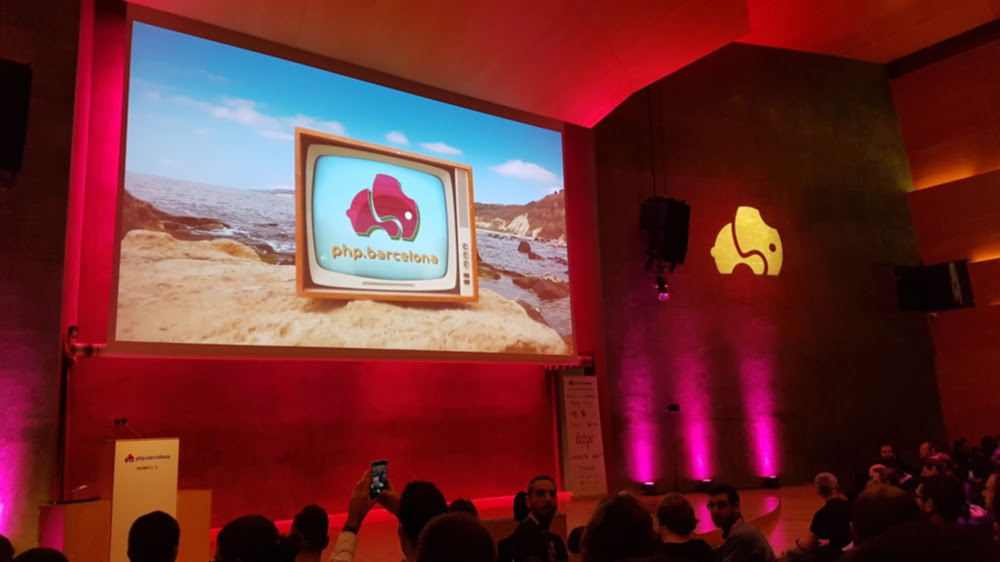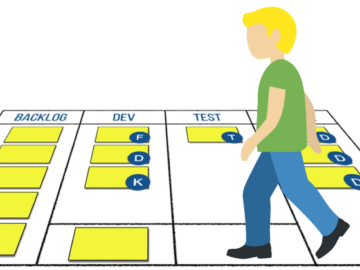I and the rest of the PHP engineers at ottonova, had the pleasure of attending the PHP.Barcelona Conference in November this year. It was a great experience, spanning over two full days.
I’ve put together some quick and biased notes about the presentations. Here it goes…
 Owned by the author
Owned by the authorDay 1
Opening Keynote – Rasmus Lerdorf
Really uplifting beginning of the conference with Rasmus going down memory lane. We got to know some of the motivation and the process of creating PHP. All this further strengthening my opinion that it didn’t really start as serious programming language. (Ok. I admit. It did progress since then, so don’t start throwing stones.)
A funny highlight was the explanation that “PHP is vertically consistent” – the PHP functions match the vendor functions they create an API for. Of course, this leaves it inconsistent with itself.
Also, really enlightening, was clarifying why adding things like further type checking, generics, or class modifiers, like “immutable” would be a serious performance hit to the language – so we should really stop hoping that any of that would come soon.
From Helpers to Middleware – Marco Pivetta
Nice practical presentation. It showed how design can incrementally evolve, from what would basically be spaghetti code, into a proper modular and scalable middleware-style architecture. While a good start, I would have hoped to see a deeper dive into this style, because where it stopped it felt like it just scratched the surface.
Microservices gone wrong – Anthony Ferrara
Although this was just a public retrospective of a specific project, which maybe will not resonate with everyone, for me and the work we do at ottonova, there were still a couple of valuable lessons to take home:
- Messages that microservices use to synchronize can be differentiated into proper Events and RPCs, and these categories can and maybe should be treated differently. The latter require a response back, while the former don’t really need it. We don’t have this clear separation ourselves yet, but the need for it is definitely starting to show.
- Each entity in your domain does not need to have its own service. Larger services are also fine, if they make sense for your use case. Our own setup is using domain-defined microservices, of various sizes, so seeing that splitting everything aggressively may backfire will make us think twice when extracting a new microservice.
He has a cute dog.
Serverless PHP applications with Bref – Matthieu Napoli
I guess it’s nice to see that there is a way to hook up PHP to Lambda, but then again, why take the effort to force it and not just use a language supported directly? Apart from that aspect, interesting to see an intro into AWS Lambda, since I didn’t try it out myself yet.
JSON Web Tokens – Sam Bellen
Not that much to say here: JWTs. We already use them, you should use them too. They’re easy to work with and really useful. At their core they are just signed information in a nice and standard JSON format. Nevertheless still a very powerful concept as it enables you to transfer claims securely from one party to another.
Developing cacheable PHP applications – Thijs Feryn
Well, this one was awkward. Especially since I had the pleasure of sitting through this exact presentations some months before. Thijs is a dedicated evangelist, you have to give it to him. He manages to squeeze everything out of what Varnish can do and serve it to his audience on a silver platter.
Now come the buts. The use-cases considered in the presentation are outdated. Really focusing too much on server side rendering and templating. And I particularly did not enjoy instructing an auditorium full of developers (maybe some more impressionable than other) to use their caching layer for keeping application logic.
Nothing wrong with Varnish itself, though. And since we need to keep all our data inside Germany, for legal reasons, maybe we’ll need to consider ourselves an on-premise caching solution in the future.
PHP Performance Trivia – Nikita Popov
Really confident presentation from one of the core PHP contributors, containing a deeper dive into how the OPcache works, and what its limitations are. Not that serious limitations, if you ask me. With a bit of care for how you handle deployments, you should be fine.
Also interesting to see some benchmarks that show that using objects instead of arrays is much more memory-efficient in PHP. Not that the opposite would have made us drop using Value Objects, but still good to see that we’re already using the memory friendly option.
Get GOing with a new language – Kat Zień
While there was nothing spectacular about this presentation, just an intro into Go, I still enjoyed seeing that there is a clear interest from the PHP community to explore other languages. Go is particularly relevant for us at ottonova, since we’re already using it for our messaging setup and we plan to try some more areas where we think it would do a better job than good old PHP.
Day 2
Advanced Web Application Architecture – Matthias Noback
Nice structured first dive into DDD and the rationale of it. We’re already doing most of what this presentation talks about, and much more, at ottonova, but it helps to see another’s take on it and double-check our approach.
It was reassuring to see that one of the first requirements of DDD is to separate your Domain from your Infrastructure, a thing that we carefully follow, along with some more advanced techniques.
Also really appreciated the general advice that not every project is the same and if something applies somewhere it does not automatically mean that it will apply to your situation. This is, of course, common sense, but it doesn’t hurt to hear some basic common sense from time to time, in a world overflooded with strong opinions.
Working with Webhooks – Lorna Mitchell
Decent structured presentation about Webhooks – an architectural style for async communication. Nothing groundbreaking here, but since this style is not standardly used (or at least not by me), it’s nice to be reminded it exists. Good tip with using ngrok for exposing local stuff.
Supercharge your apps with ReactPHP & PHP-PM – Albert Casademont
Since FPM is already showing its scaling limitations for us, it was particularly interesting to see what other options would be available.
For many of our processed requests, we have the common pattern that we get some input, we process it, and then pass it to another service (maybe external) and wait for a response. Then we do some more work on it and respond to our client. This implies considerable processing power wasted on our side – we wait a lot for HTTP responses ourselves. This is where some concurrent PHP would come in handy. While one request is waiting, other requests can be handled. So we will definitely be looking into either PHP-PM, or Swoole in the future.
It’s all about the goto – Derick Rethans
This was a nice, theoretical, dive into how PHP parses and executes code. For someone with a minimal Computer Science background, I think it was still fairly basic, and I don’t think there was much to take away.
Develop microservices in PHP – Enrico Zimuel
This was an interesting walk-through what are some of the benefits, and specific concerns, of using microservices. Nothing too new to us, since we already heavily rely on microservices both in the PHP group and in our other teams.
One thing we noted down to improve was the standardisation of error responses. Good hint. We’ll definitely look into that one.
Mutation Testing – Better code by making bugs – Théo Fidry
Mutation Testing seems really cool as a theoretical concept, and it’s nice to see that someone is trying it out. Not sure how it would work out in practice. So far, I can see two major downsides. First, it simply takes a lot of time to run such a test. Even with optimisations, this will be something that could take hours. Second, the testing itself seems only as good as your mutators, and I think writing relevant mutators is not a trivial task. Having some that just replace operators could be straight-forward, but how much does that help?
Back to Munich
And the rest we sadly had to skip, to not miss our plane back home.
Overall, as we hoped when booking the tickets, the lineup was a solid one. And they delivered. Kudos to them, as well as to the organizers. We came back with lots of new ideas, some that we will try in the near future, and confirmation that we are on the right track with many of our architectural decisions.
We will definitely have Barcelona on our list for next year as well. Lovely city too.



